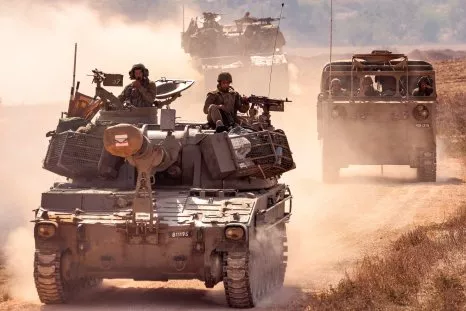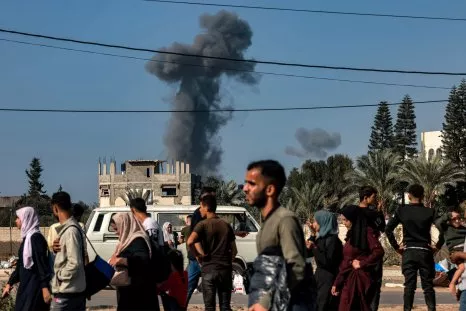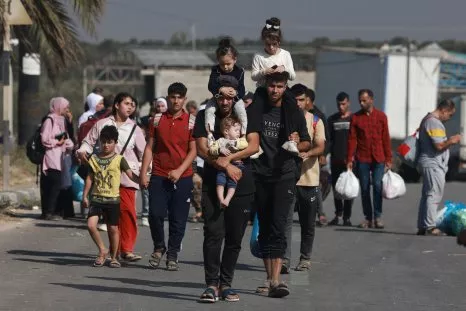Taiwan's Long Wait for Nearly $20 Billion in American Weapons
To stave off a possible invasion of Taiwan, the United States must expedite the delivery of billions of dollars in weaponry it has earmarked for the country, American scholar Larry Diamond said Wednesday
"There would be no injury to global democratic order and to global democracy that would be more serious that China could inflict in the coming years than an all-out assault on Taiwan in an effort to impose a unilateral solution to the conflict across the [Taiwan] Strait," Diamond said in a live-streamed speech at the Taipei Security Dialogue, organized by Taiwan's top defense think tank.
Supply chain woes brought on by the COVID-19 pandemic, followed by the U.S. defense industry's scramble to arm Ukraine's resistance against Russia's invasion early last year, has pushed back the delivery of more than $19 billion in weapons systems and munitions purchased by Taiwan in recent years.
Diamond, who is a senior fellow at the Hoover Institute think tank, also said Washington should move to jointly develop weapons systems with Taipei. Having this capacity within Taiwan would reduce reliance on shipments from the U.S., its main arms supplier, which could be threatened by a Chinese blockade around the island nation—something Ukraine does not have to worry about.
China claims self-ruled Taiwan as its own and has vowed to annex it, even it if must resort to war to do so. The Taiwanese government and its public have long rejected Beijing's sovereignty assertions.
"In order to ensure Taiwan's military security, it's vitally important that Taiwan receive all the weapons that it needs to defend itself and to deter military aggression," Diamond said, adding that this applies both to the current backlog and to "accelerated delivery of future weapons."
"All military procurement requests to the U.S. have been based on the needs of defense operations, followed budgetary legal procedures, and are paid according to actual progress," Taiwan's Defense Ministry said on Wednesday.
The U.S. and Taiwan will keep cooperating to speed up delivery and "jointly maintain regional peace and stability," it said.
Experts fear the backlog hampers Taiwan's efforts to modernize its military and gird itself for a potential confrontation with China, which has been increasingly conducting military exercises near the island country.
A breakdown of the backlog published on Monday by the Cato Institute, a think tank in Washington, D.C., said $12.1 billion, or 63 percent, was comprised of "traditional" weapons platforms, such as tanks, warships and fighter planes.
The two largest sales—108 Abrams tanks and 66 F-16 fighter jets that the State Department approved for sale in 2019—made up over half the total value of the list, the report said.
Meanwhile, $2.8 billion, or 14.6 percent, of the delayed equipment was for munitions sold separately from the weapons that use them.
Asymmetric weaponry, which the Cato Institute defines as "weapons that are mobile, relatively low cost, and counteract Chinese military advantages without emulating them, accounts for $4.22 billion, or 22 percent of the backlog. An example of this is the anti-ship Harpoon coastal defense system.
Defense experts have questioned the utility of Taiwan using larger, traditional military assets.
These are easier to target, and the island country cannot hope to purchase them in numbers comparable to China's, former Taiwanese Chief of the General Staff Admiral Lee Hsi-min wrote in a 2022 book on the subject.
Instead, Lee said Taiwan should stockpile smaller and more mobile weapons that would be more likely to outlast China's initial wave of missile strikes.
Taiwan's defense budget in 2022 was just $19 billion compared to China's $292 billion.
Newsweek has reached out the U.S. Department of Defense with a request for comment.
Taiwan has gradually taken steps on its own to bolster its preparedness, including boosting defense spending to 2.5 percent of its GDP, extending compulsory military service from four months to a year, and defying expectations in September by inaugurating the first of eight planned homemade submarines.
Diamond said that for Washington's part, it also "has to deploy more military force to this region."
Update 11/10/2023 2:00 ET: This article has been updated with additional information.
Disclaimer: The copyright of this article belongs to the original author. Reposting this article is solely for the purpose of information dissemination and does not constitute any investment advice. If there is any infringement, please contact us immediately. We will make corrections or deletions as necessary. Thank you.





